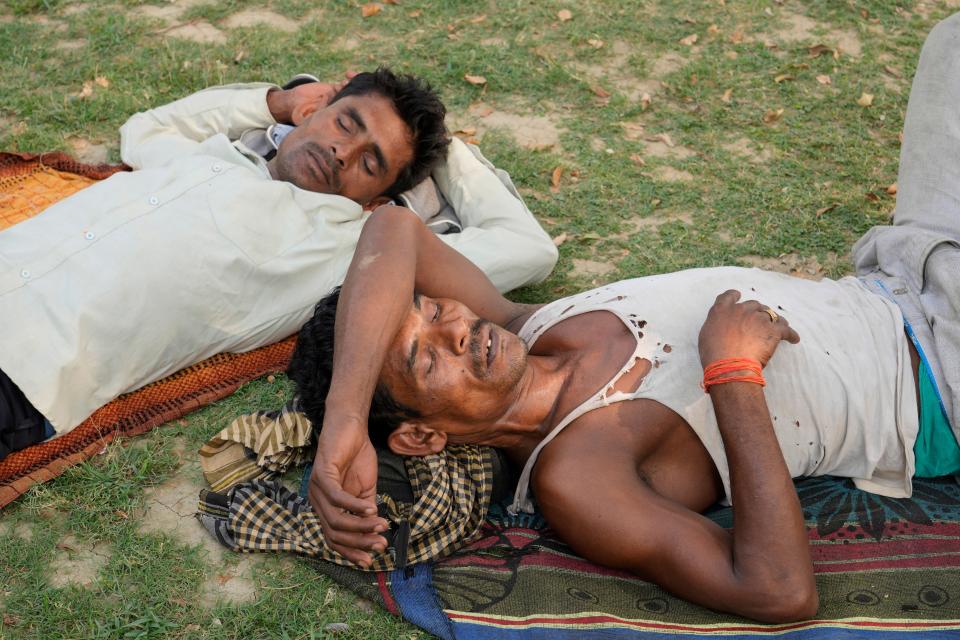Fierce heat wave in India and Pakistan 30 times more likely because of climate change
This spring's punishing heat wave in India and Pakistan, which has caused widespread human suffering and affected global wheat supplies, was about 30 times more likely to happen because of human-caused climate change, according an analysis Monday.
The heat wave has caused at least 90 deaths across India and Pakistan and triggered an extreme glacial lake outburst flood in northern Pakistan and forest fires in India.
Temperatures soared above 110 degrees; some areas hit as high as 115 degrees.
"High temperatures are common in India and Pakistan, but what made this unusual was that it started so early and lasted so long," said study co-author Krishna AchutaRao of the Centre for Atmospheric Sciences at the Indian Institute of Technology in Delhi.
"Across much of both countries, people had little relief for weeks on end, with the costs particularly high for hundreds of millions of outdoor workers. We know this will happen more often as temperatures rise, and we need to be better prepared for it," AchutaRao said.

The region is known for high heat in the spring and early summer, and May is typically the hottest month of the year. This heat wave raised temperatures 8 to 15 degrees above normal across much of India, NASA's Earth Observatory reported.
What is the highest temperature recorded in India?
March 2022 was the hottest March India has recorded since record-keeping began 120 years ago. The capital region of Delhi recorded its second-hottest April in 72 years, according to the Times of India.
CLIMATE CHANGE: Punishing heat wave in India reaches 115 degrees, part of a 'hotter and more dangerous world'
According to the study, prepared by the World Weather Attribution group, the heat reduced India’s wheat crop yields, causing the government to reverse a plan to supplement the global wheat supply affected by the war in Ukraine.
In India, a shortage of coal led to power outages that limited access to cooling, compounding health impacts and forcing millions of people to use coping mechanisms such as limiting activity to the early morning and evening.
“In countries where we have the data, heat waves are the deadliest extreme weather events," said study co-author Friederike Otto, a senior lecturer in climate science at the Imperial College London's Grantham Institute, which studies climate change. "At the same time, they are the type of extremes most strongly increasing in a warming world. As long as greenhouse gas emissions continue, events like these will become an increasingly common disaster.”
Is India becoming too hot?
Worldwide, heat waves have been made more likely and more intense by climate change, the study said. To quantify the effect of climate change on the high heat in India and Pakistan, scientists analyzed weather data and computer simulations to compare the climate as it is, after about 2.2 degrees Fahrenheit of global warming since the late 1800s, with the climate of the past, following peer-reviewed methods.
Because of climate change, scientists determined, the probability of such a heat wave has increased by a factor of about 30.
The results are conservative: An analysis published last week by the United Kingdom’s Meteorological Office said that a heat wave in 2010 was probably made 100 times more likely by climate change, and such scorching temperatures are likely to reoccur every three years.
“Heat waves also have the potential to increase risk of forest fires and even droughts," said study co-author Arpita Mondal of the Indian Institute of Technology in Mumbai. "Thousands of people in this region, who, to begin with, contributed very little to global warming, are now bearing the brunt of it and will continue to do so if emissions are not significantly cut globally.
"This is a sign of things to come," Mondal said.
Contributing: Elizabeth Weise, USA TODAY; The Associated Press
This article originally appeared on USA TODAY: India heat wave 2022: Climate change makes it 30 times more likely

 Yahoo Movies
Yahoo Movies 
